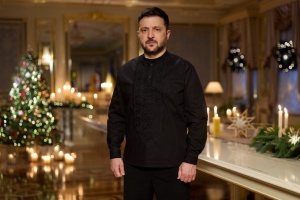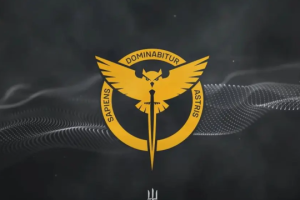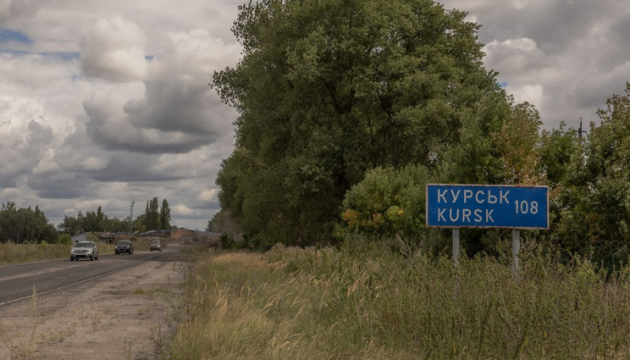
Napoleon, Hitler, and the Ardennes: Russian propaganda manipulating history to discredit Ukrainian operation in Kursk region
Russian propaganda often misinterprets and distorts various historical events to explain its unjustified aggression against Ukraine. In particular, this relates to the fake narratives that allegedly “Ukraine was created by Vladimir Lenin” or “the Austrian General Staff” during World War I.
The successes of the Ukrainian army during the operation in Russia’s Kursk region have forced Russian propaganda to resort to new absurd historical parallels. To give more weight to their propaganda narratives, Russian information forces use their own “experts” in the West and distort theses in publications of reputable world media outlets.
For example, Russian media, z-Telegram channels, and bots on social media platform X began spreading an excerpt from an interview with American leftist economist and communist Richard Wolff with Brazilian YouTube blogger Nima Rostami Alkhorshid. In the video, Wolff claims that Ukraine is bound to lose after the start of its operation in the Kursk region because “Napoleon and Hitler's armies failed before, even though they were stronger and less corrupt than Ukraine.” This is exactly the thesis of the American economist that Russian propaganda is spreading.
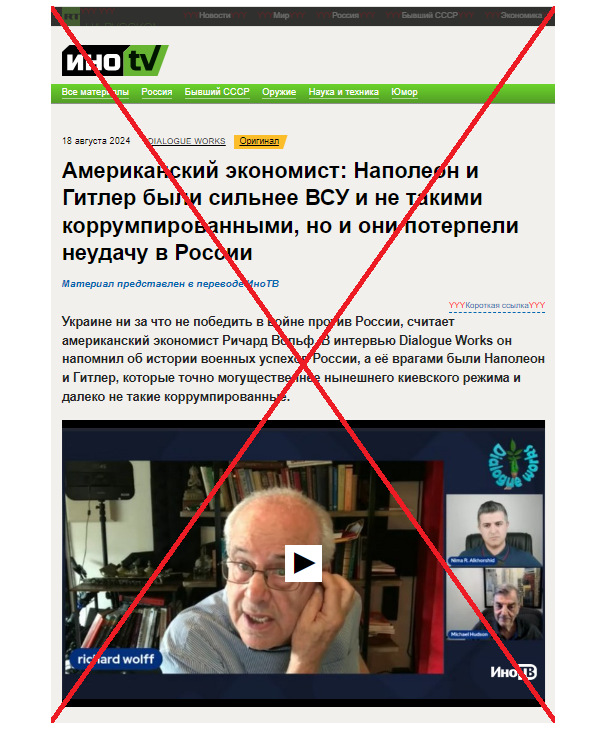
This is a fake and manipulation. Firstly, this is Richard Wolff's personal opinion that is not based on real facts or analysis of the military situation in the Russian war against Ukraine.
Secondly, Russian media frequently quote Wolff, as he is a pro-Russian propagandist. In his speeches, he has repeatedly promoted Russian narratives about the lack of impact of U.S. sanctions on the Russian economy, the leadership of the BRICS countries compared to the G7 countries, and the ineffectiveness of U.S. weapons against Russian ones.
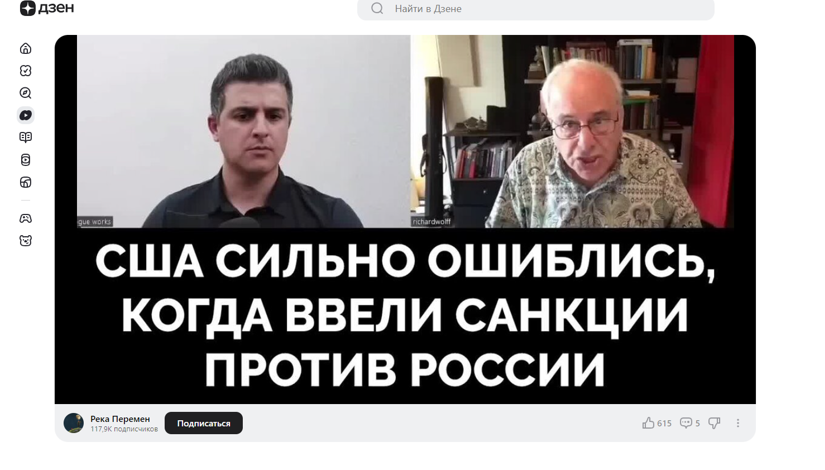
He also blames the Ukrainian government for the war, not Russia or President Vladimir Putin, thus justifying Russian aggression. On social media platform X, Richard Wolff wrote: “What Zelensky says: Ukrainians will never forgive Russians for this war. What Zelensky fears: Ukrainians will never forgive him for this war too. In war and politics, the transition from hero to villain can happen quickly.”
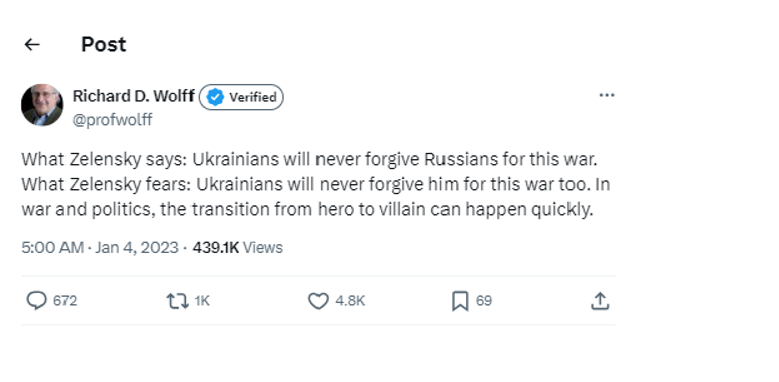
Third, the Dialogue Works YouTube channel, where Richard Wolff voiced his statements, is a media platform for pro-Russian propagandists and conspiracy theorists. Regular speakers on Dialogue Works include Scott Ritter, a guest of Putin's most vocal propagandist Vladimir Solovyov, known for his anti-Ukrainian stance, pseudo-expert Larry Johnson, and former Soviet emigrant Dmitry Orlov. All of them are united by the fact that they spread fake news about Ukraine to the English-speaking audience on a near-daily basis and their prediction of the "inevitable defeat" of the Armed Forces of Ukraine (AFU).
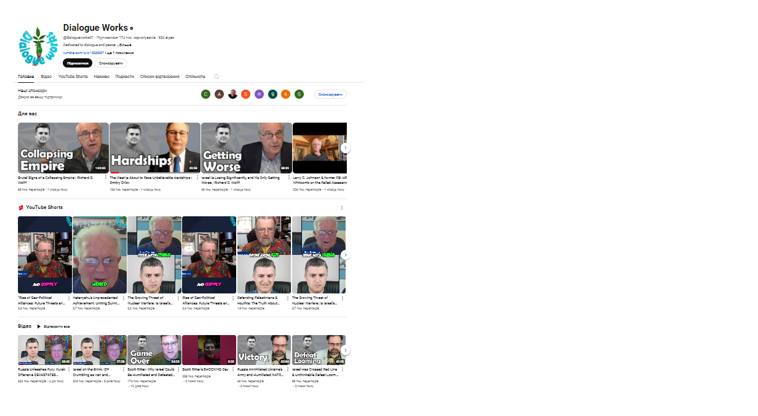
In this way, in particular, Russian propaganda is attempting to draw parallels between the results of Napoleon Bonaparte's intervention in 1812 and the events in the Eastern European theater of World War II with the currently unknown results of the AFU operation in the Kursk region.
Nevertheless, a comparison of these historical events with the present is inaccurate. Back then, the armies of Napoleon and Hitler invaded the Russian Empire and the USSR, respectively. Now, Russia itself is the aggressor. Ukraine is merely defending its own territories and publicly stating that it is not going to annex Russian lands. It is noteworthy that in both of the past wars, Ukrainians and Belarusians played a pivotal role in the victory. The two peoples suffered the highest proportionate losses within the USSR.
Another example of the manipulation of historical facts for propagandistic purposes is the comparison of the Kursk operation with the Ardennes Offensive in December 1944-January 1945. At that time, an initially successful and desperate attack by the Wehrmacht led to a catastrophic defeat and was the last major offensive operation by Adolf Hitler's troops.
Russian propaganda has launched a comprehensive information campaign that draws parallels between the Kursk operation conducted by the Ukrainian Armed Forces and the Ardennes Offensive, promoting the idea that the results of these operations will allegedly be the same.
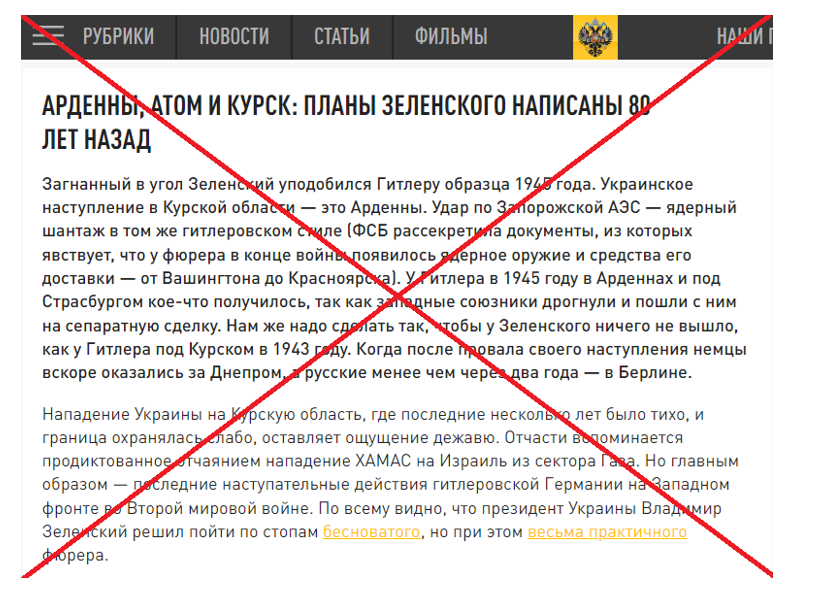
These narratives are spread by the main Russian and Belarusian media outlets and z-bloggers on social media platform X. They all refer to an article by Germany’s Die Welt journalist Christoph Schiltz. The propagandists devote particular attention to the comparison between the battles in the Ardennes Forests in the winter of 1944 and the events in the Kursk region in 2024, as referenced in the German publication.
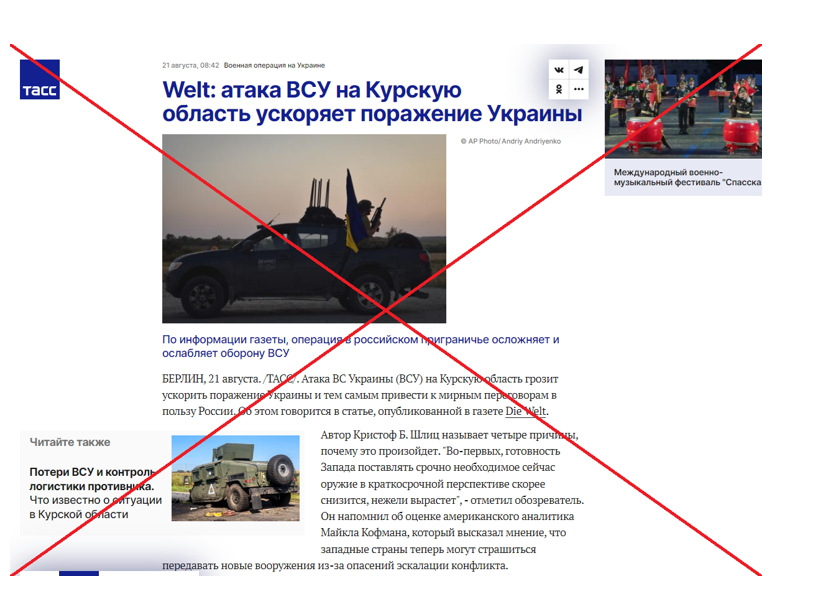
However, Russian propaganda is resorting to manipulation. In the article “Why the Kursk operation accelerated Ukraine’s defeat,” the author cites four reasons why this operation could not succeed. However, this is only his personal opinion. Christoph Schiltz knows nothing about the intentions of the Ukrainian command or the resources available to the Ukrainian defense forces. The article was published in the Opinion section, where the authors present their personal viewpoint on the subject matter.
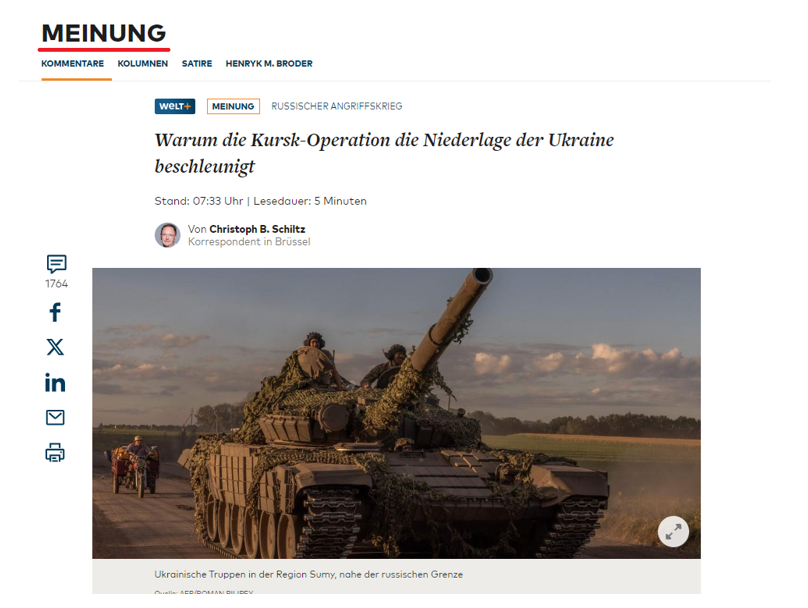
In one of the paragraphs of the article, Christoph Schiltz did note that the Ukrainian operation could end up like the Ardennes operation, but only if the Western allies stop assisting Ukraine. At the end of the text, he calls for preventing this from happening and continuing to help the Ukrainian army.
It is not the first time that Russian propaganda has manipulated Christoph Schiltz's articles and often takes his theses out of context. For example, at least 15 similar publications can be found on the Russian website InoSMI.
In other words, Russian propaganda has simply taken out of context some personal opinions expressed by the Die Welt author and passes them off as those of an authoritative publication.
This is done to sow doubt in the actions of Ukraine's political and military leadership and to demoralize society and the will to fight the aggressor. After all, such unfounded historical analogies of Russian agitation propaganda are aimed at promoting the narrative that Russia cannot be defeated because Russia allegedly “always wins,” which is not true.
The Russian Empire at least suffered defeat in the Crimean War, the Russo-Japanese War, and World War I. The USSR similarly suffered defeat in conflict in Afghanistan. All these defeats led to political changes and the collapse of those in power, and even the collapse of empires that were the predecessors of modern Russia.
As Ukrinform reported, Russia's propaganda spreads fakes about Ukrainian forces “looting” in the Kursk region.
Andriy Olenin

